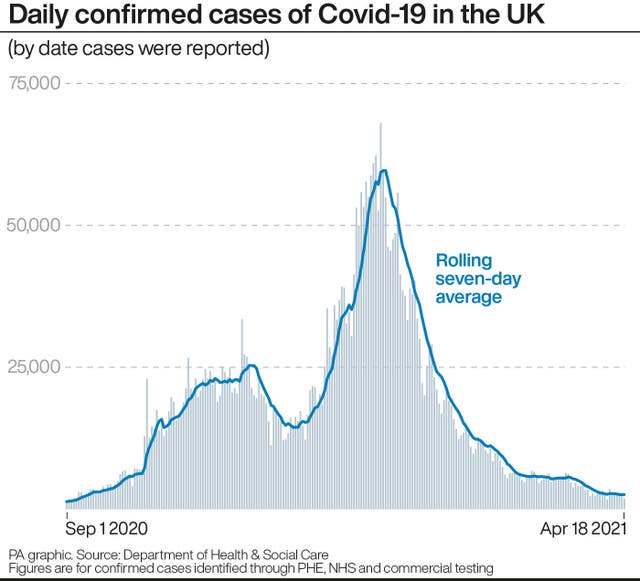
The variant of coronavirus first identified in India is likely to become a “variant of concern” which could potentially lead to the country being put on the UK’s travel “red list”, an immunology expert has said.
Danny Altmann, professor of immunology at Imperial College London, said variants of the virus which causes Covid-19 “do pose a threat” and vulnerable people could be “caught out”.
Dozens of cases of the variant have been identified in the UK.
The variant, also known as B.1.617, is currently designated as a “variant under investigation” (VUI) rather than a “variant of concern” (VOC), such as those first identified in Kent, Manaus (Brazil) or South Africa.
Prof Altmann said some people in the population are still vulnerable and can “still be caught out” by variants.
He told ITV’s Good Morning Britain: “I am concerned about all the variants. Don’t get me wrong, I think our road map is going well and at the moment, in this country, we are doing rather well, enjoying unlocking.
“But out there, there is the Indian variant, the South African, Brazilian etc, and they do pose a threat.”
READ MORE: Boris Johnson cancels trip to India in wake of new virus variant
He added: “At the moment, we are still vulnerable, and some people in our population are still vulnerable – what I mean by that is the Indian variant, for example, certainly has a mutation like the ones that evade the best neutralising antibodies.
“What that means is, if you have a population where at least half of us have had zero or one dose of vaccine, some won’t have made a very good response to the vaccine, because perhaps they are very old or obese or unwell, we still have a very large vulnerable population who can still be caught out by variants like this.
 (PA Graphics)
(PA Graphics)
“At the moment, this particular variant is called a variant under investigation, not a variant of concern because it hasn’t been escalated to that level yet.
“My assumption from everything I’ve seen is that it will become a variant of concern.
“When it becomes a variant of concern, I’d be quite surprised if India wasn’t on the red list.”
READ MORE: Scientists urged to speed up Indian variant analysis amid travel ban calls
According to the latest update from Public Health England (PHE), 73 cases of the B.1.617 variant, which was first discovered in India, have been found in England, as well as four cases in Scotland.
There are four so-called “variants of concern” and seven “variants under investigation” which have been identified in the UK.
Prime Minister Boris Johnson cancelled his trip to India as the number of infections in the country continue to climb.



Why are you making commenting on The Herald only available to subscribers?
It should have been a safe space for informed debate, somewhere for readers to discuss issues around the biggest stories of the day, but all too often the below the line comments on most websites have become bogged down by off-topic discussions and abuse.
heraldscotland.com is tackling this problem by allowing only subscribers to comment.
We are doing this to improve the experience for our loyal readers and we believe it will reduce the ability of trolls and troublemakers, who occasionally find their way onto our site, to abuse our journalists and readers. We also hope it will help the comments section fulfil its promise as a part of Scotland's conversation with itself.
We are lucky at The Herald. We are read by an informed, educated readership who can add their knowledge and insights to our stories.
That is invaluable.
We are making the subscriber-only change to support our valued readers, who tell us they don't want the site cluttered up with irrelevant comments, untruths and abuse.
In the past, the journalist’s job was to collect and distribute information to the audience. Technology means that readers can shape a discussion. We look forward to hearing from you on heraldscotland.com
Comments & Moderation
Readers’ comments: You are personally liable for the content of any comments you upload to this website, so please act responsibly. We do not pre-moderate or monitor readers’ comments appearing on our websites, but we do post-moderate in response to complaints we receive or otherwise when a potential problem comes to our attention. You can make a complaint by using the ‘report this post’ link . We may then apply our discretion under the user terms to amend or delete comments.
Post moderation is undertaken full-time 9am-6pm on weekdays, and on a part-time basis outwith those hours.
Read the rules here